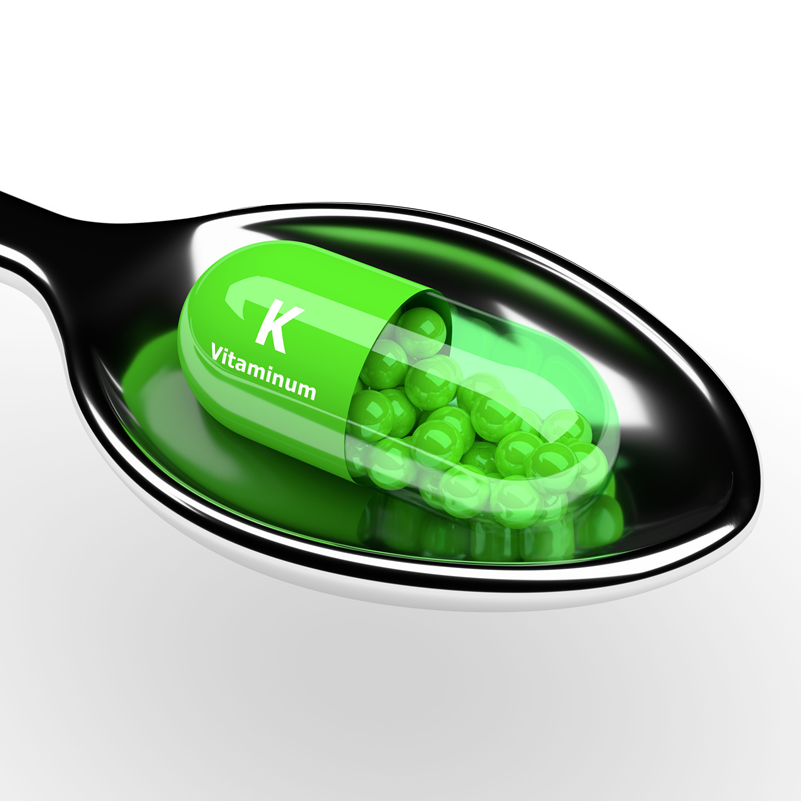Vitamin K-2
Your Lungs and Covid-19
By Joel Thuna
You probably don’t know about Vitamin K2. Vitamin K was discovered in the 1930’s in Denmark. In the 1940’s work on it won the Nobel Prize. It got its name from coagulation (in German it’s spelled with a K because its role in coagulation is how it was discovered). In the 1970’s researchers discovered that K is actually a family of vitamins; K1 which is involved in coagulation, and K2 which is involved both in coagulation and calcium balance.
Vitamin K2 is available in 2 forms; MK-4 and MK-7. They differ by their molecule length (MK-7 is longer). The good news is that your body has the ability to convert the longer one (MK-7) into the shorter one if required. That’s one reason why MK-7 is the preferred form. Vitamin K2 MK-7 is a really small dose nutrient. It’s effective in doses as low as 30mcg. That’s 1/2000 of a grain of salt. It’s safe. How safe? They have tested it in doses 160 million times its effective dose, for long periods of time with no negative effect. THAT’S SAFE!
Lung health is a timely topic with the world still trying to cope with the COVID respiratory virus pandemic. Let’s look at your lungs and what K2 MK-7 can do for them. Every cell in your body needs oxygen in order to live. The air we breathe contains oxygen and other gases. When you breathe in, your lungs expand to take in and process the air. Once in the lungs, oxygen is moved into the bloodstream and carried through your body. At each cell in your body, oxygen is exchanged for a waste gas called carbon dioxide. Your blood carries carbon dioxide to your lungs. When you breathe out, your lungs contract and push carbon dioxide out.
It is natural for your lungs’ abilities to decline gradually as you age. This can make breathing slightly more difficult as you get older. Beyond this natural decline, there are several ways your lungs can get damaged. The most common damage occurs from smoking, vaping and second hand smoke. Smoke damages your airways and the small air sacs (alveoli) that expand and contract in your lungs. This leads to lung diseases including COPD, which includes emphysema and chronic bronchitis. In both of these conditions, airflow is reduced due to inflammation, scarring and breakdown of both lung tissue and the small airways in the lungs. The same damage that smoke causes can also be as a result of long-term exposure to lung irritants (chemicals, fires) and chronic bacterial infections.
Pneumonia is an infection that inflames lung alveoli. The air sacs can fill with fluid or pus, reducing the ability to take in oxygen. This causes coughing with phlegm or pus, fever, chills and difficulty breathing. Pneumonia can be caused by a variety of organisms, including bacteria, viruses and fungi.
COVID is insidious in how it affects your lungs. It attacks them on multiple fronts. COVID can cause pneumonia causing the lungs to become filled with fluid and inflamed, leading to breathing difficulties. While most people recover from pneumonia without any lasting lung damage, the pneumonia associated with COVID-19 may be severe. Even after the disease has passed, lung injury may result in breathing difficulties that might last.
If the pneumonia does not resolve, but actually worsens, more alveoli become filled with fluid leaking from blood vessels in the lungs. Eventually, severe shortness of breath sets in and leads to acute respiratory distress, a form of lung failure. These are the patients who are unable to breathe on their own and require ventilators to survive. People who survive respiratory distress and recover from COVID-19 may have lasting damage and scarring in their lungs.
In order for your lungs to work properly they need to be soft, supple and elastic. With these properties they can expand and contract fully, enabling them to receive and push air (and with it oxygen and carbon dioxide) so that we can breathe. There is one special protein that enables tissue (lungs, arteries, skin and connective tissue) to remain soft, supple and elastic. This protein is roughly 1000 times more flexible than collagen. It’s called elastin.
It is no coincidence that elastin sounds very much like elastic. Think of elastin fibres as elastics. They stretch and contract enabling tissues that contain them to expand, contract and return to shape time and again. Much like many other bodily structures, your elastin peaks when you are young and slowly degrades as you age. This is one reason why skin sags more with age.
Elastin has one rather glaring flaw. It really likes calcium. Elastin will pull calcium from wherever it can get it (surrounding tissue). Unfortunately, calcium binds to elastin, reducing its elasticity. This is called elastin degradation. If enough calcium is present, the elastin becomes degraded and can no longer stretch and in effect becomes useless. This results in stiffening and hardening of the lungs, reducing their ability to expand and contract, reducing your ability to breathe. This elastin degradation combined with scarring, is the net effect of lung diseases. The two processes of damage combine to slowly decrease lung capacity and destroy lung tissues.
Vitamin K2 MK-7 plays a vital role in calcium metabolism in our bodies. It activates Matrix GLA Protein, the protein responsible for removing calcium from our arteries; K2 MK-7 also activates Osteocalcin, the protein responsible for putting calcium into bones and teeth. Together these proteins take calcium away from where we don’t want it and put it where we do.
Luckily for us, Vitamin K2 MK-7 does the same thing in lung tissue. It removes calcium from your lungs to deposit into your bones and teeth. By removing the calcium from surrounding tissue, it leaves it unavailable for elastin. This has the net effect of preserving elastin, enabling your lungs to remain soft, supple and elastic.
Primarily because of this property, researchers have found that supplementing with Vitamin K2 MK-7 reduces your risk of multiple lung diseases including COPD, emphysema by a staggering 39%.
In COVID-19 the science is quite interesting. Will Vitamin K2 prevent COVID-19 infection, NO! That would be too much to ask. Let’s look at what the virus does. COVID-19 causes blood clotting and degradation of elastic fibres in the lungs. Here are two of the key processes that Vitamin K2 MK-7 is involved in. K2 MK-7 as we have discussed reduces degradation of elastin, preserving lung health. Vitamin K2 also activates proteins c, s and z, which together regulate clotting and coagulation. So Vitamin K2 MK-7 is prime in the fight to help your body weather the storm of COVID.
In multiple studies, researchers looked at patients who have contracted COVID-19 and found “a link between vitamin K2 MK-7 deficiency and the worst coronavirus outcomes”. Essentially the patients with lower daily intakes of K2 MK-7 were more likely to have serious (bad) outcomes from the virus. They found that when fighting COVID, the body rapidly used up K2 MK-7 stores, so having larger stores could help. I take K2 MK-7 daily now as part of my home-grown health insurance plan.




